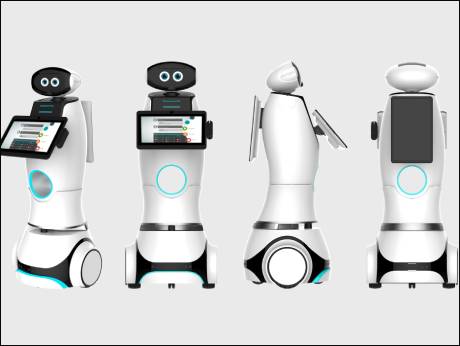
Workplace Robotics-II
Taiwan/Mumbai, June 18 2020: - As a response to COVID-19, social distancing has been applied for epidemic prevention to reduce human contact. Incidentally, this has led to the resurgence of business opportunities of intelligent unmanned systems. Services such as temperature checks at commercial building entry points, cleaning and disinfecting of large venues, distribution of e-commerce items, security patrols, etc., can all be immediately provided using AI robots so as to reduce the risk of human-to-human transmission.
According to estimates from the International Federation of Robotics (IFR), professional robots in the global service robot market will increase to 736,000 units between 2019-2021, raising the compound growth rate for innovative and smart applications to 21%.
Taiwan's Ministry of Science and Technology invested NT$5 billion in 2018 to promote Taiwan's AI development, including the establishment of four major AI innovation research centres, a national-level AI computing platform, Maker Space robot, and Moonshot Project to create smart living with concrete plans and tap into future AI business opportunities.
In order to create a smart dining environment, TECO’s meal delivery and tray retrieval robot "Enviro" has become Taiwan's first customized dish collecting robot. The Automated Guided Vehicle (AGV) at the bottom uses TECO DC servomechanism and motor and has a maximum load of 40 kilograms. Enviro is equipped with optical radar scanning and ultrasonic sensors. Data is collected and computed using AI automatic navigation system to quickly construct a walking map. It also features a smart obstacle recognition function to prevent collision with passengers and works continuously for more than 8 hours when fully charged.
BenQ's smart medical delivery robot (Mibot) has already been used in Yuanlin Christian Hospital. Mibot can transport wastes, reduce delivery time, lower labor costs as well as risks of cross-contamination. Using an app for smart remote control and management, the robot is easily directed to the designated operating room for transporting. The robot's body can also be cleaned by wiping alcohol to ensure proper hygiene. Taking into consideration the needs of its customers, BenQ is planning on gradually adding drug transport, disinfection, health education information, and other functions to Mibot.
Micro-Star International has also been investing in R&D of service robots in recent years, combining robot technology with medical staff carts to create the "AI-UVC Disinfection Robot" with UV lights. The robot has already been used in nursing homes and hospitals. It is able to carry out disinfection and cleaning even in public space with dense crowds or poor ventilation, effectively setting up a defense shield for environmental cleanliness. It works as a substitute for extra personnel during periods of epidemic prevention and lowers the risks of infection. The robot is a good match in light of the future trend for daily cleaning operations in medical facilities.
GEOSAT's C01 Service Robot uses AI algorithms for a core semantic analysis system. The smart system can recognize natural semantics to answer the customers' questions regarding hotels and stores. It can be seen in Kaohsiung's E-Da Outlet Mall, and it has also been purchased and applied in large stores in the Philippines. Also, the ASUS Zenbo Robot, winner of the Taiwan Excellence Silver Award, is the first home service robot that connects to multiple smart and traditional home appliances as well as sensing devices. It offers functions for assistance, entertainment, and companionship. Should an elderly family member fall, a notification is immediately sent to the smartphone of a pre-determined family member so as to create smart home safety.
For more information, kindly visit the virtual pavilion of Taiwan Excellence